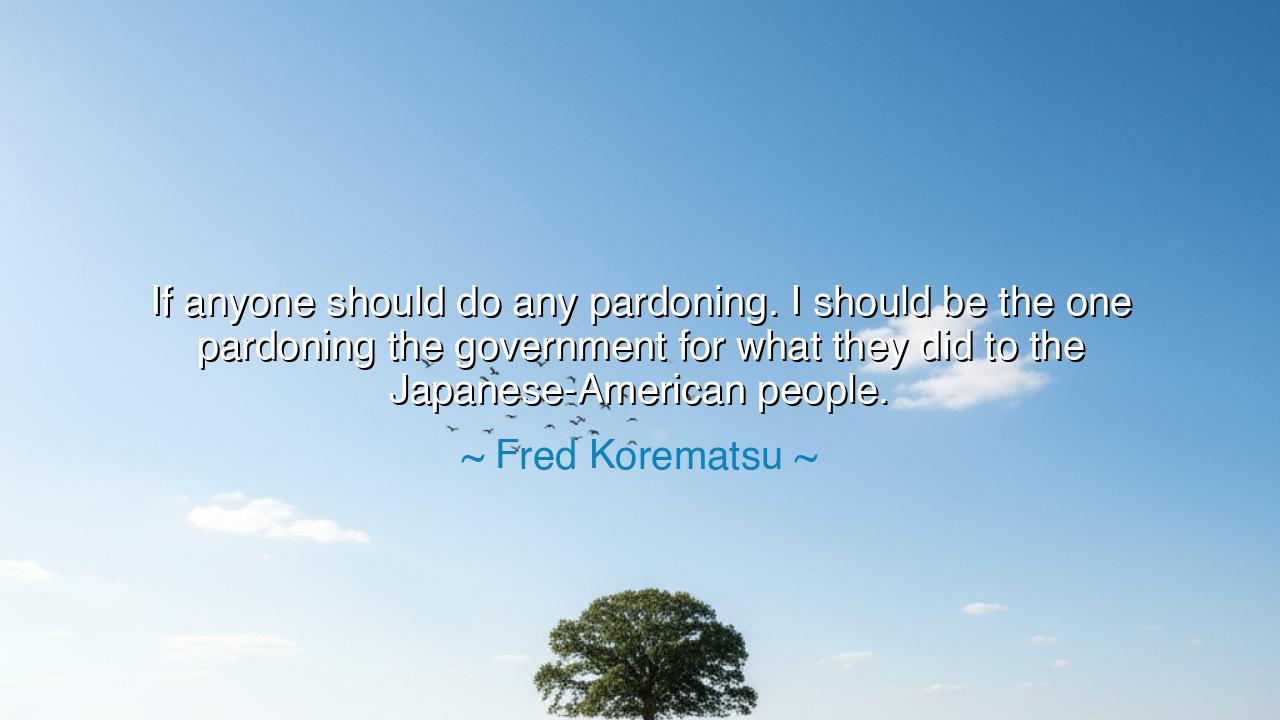
If anyone should do any pardoning. I should be the one pardoning
If anyone should do any pardoning. I should be the one pardoning the government for what they did to the Japanese-American people.






“If anyone should do any pardoning, I should be the one pardoning the government for what they did to the Japanese-American people.” Thus spoke Fred Korematsu, a man of quiet courage, whose name became a living testament to resistance, dignity, and forgiveness. His words pierce through the veil of history like a blade of light through shadow. They remind us that true justice is not born from anger, but from the heart’s ability to forgive without forgetting. In this single sentence, Korematsu reverses the weight of guilt — not to condemn, but to restore humanity to those who had taken it away. For he, who was wronged by his own nation, stood not as a victim begging mercy, but as a citizen offering it.
To understand the full power of his words, we must return to the time of their origin — to the dark years of World War II, when fear drowned reason and liberty was sacrificed at the altar of security. In 1942, following the attack on Pearl Harbor, the United States government ordered the forced removal and incarceration of over 120,000 Japanese-Americans, most of them citizens, from their homes on the West Coast. They were herded into camps behind barbed wire, stripped of property, freedom, and dignity — all because of their ancestry. Among them was Fred Korematsu, a young man from California who refused to submit to this injustice. He defied the order, was arrested, and brought before the courts for his defiance.
In 1944, the Supreme Court of the United States, the very institution meant to safeguard the Constitution, upheld his conviction in Korematsu v. United States. It was a decision that sanctified prejudice under the guise of necessity, and a wound that would fester for decades. Yet, even in the face of condemnation, Korematsu did not yield. He lived long enough to see the tides of truth shift. In 1983, his conviction was overturned when secret evidence revealed that the government had lied to justify the internment. The courts at last admitted what he had always known: that justice had been betrayed.
When Korematsu uttered these words years later, it was not out of bitterness, but out of moral clarity. He had lived to see apologies and reparations given, yet he understood something deeper — that forgiveness cannot be granted by governments; it must be offered by hearts. His declaration, “I should be the one pardoning the government,” is not arrogance, but the voice of grace rising from pain. He reminds us that the power to forgive is the final act of freedom. The oppressor may control the body, but only the oppressed can choose to cleanse the soul. In that choice lies a strength greater than any decree of law.
History offers few such examples of courage tempered by mercy. We see it in Nelson Mandela, who, after twenty-seven years of imprisonment, emerged without hatred, choosing reconciliation over revenge. We see it in Mahatma Gandhi, who met violence with peace, and in Martin Luther King Jr., who answered cruelty with love. Like them, Korematsu showed that the heart of a nation is not measured by the sins it commits, but by the souls who rise above those sins to heal it. His forgiveness did not absolve the government of guilt — it exposed the moral weight of its actions by meeting them with humanity.
And yet, his words are not soft. Beneath them lies a warning: that the power to harm and the power to heal both reside in the same hands — the hands of the people. For governments are but reflections of their citizens. When fear blinds a nation, injustice follows. When conscience awakens, justice returns. Thus, Korematsu’s quote is not merely a statement of forgiveness — it is a mirror held up to all who would trade liberty for safety, or justice for prejudice. It says: remember, lest you repeat.
The lesson is clear and eternal: never surrender your humanity, even when humanity has been denied to you. In every age, the temptation to dehumanize the “other” returns — in war, in politics, in the heart. When that moment comes, remember Korematsu, who faced his nation’s betrayal not with hatred, but with dignity. If you suffer injustice, seek truth without vengeance. If you hold power, wield it with mercy. And if your nation errs, demand justice — but never lose compassion.
For the mark of a great people is not that they never fall, but that they rise wiser from their failures. Fred Korematsu’s words endure because they remind us that forgiveness is not weakness — it is the final triumph of the free spirit. He forgave not to forget, but to teach. And so, let us remember his lesson: that to pardon with love is to reclaim one’s power, and to forgive with strength is to keep the soul of democracy alive.






AAdministratorAdministrator
Welcome, honored guests. Please leave a comment, we will respond soon